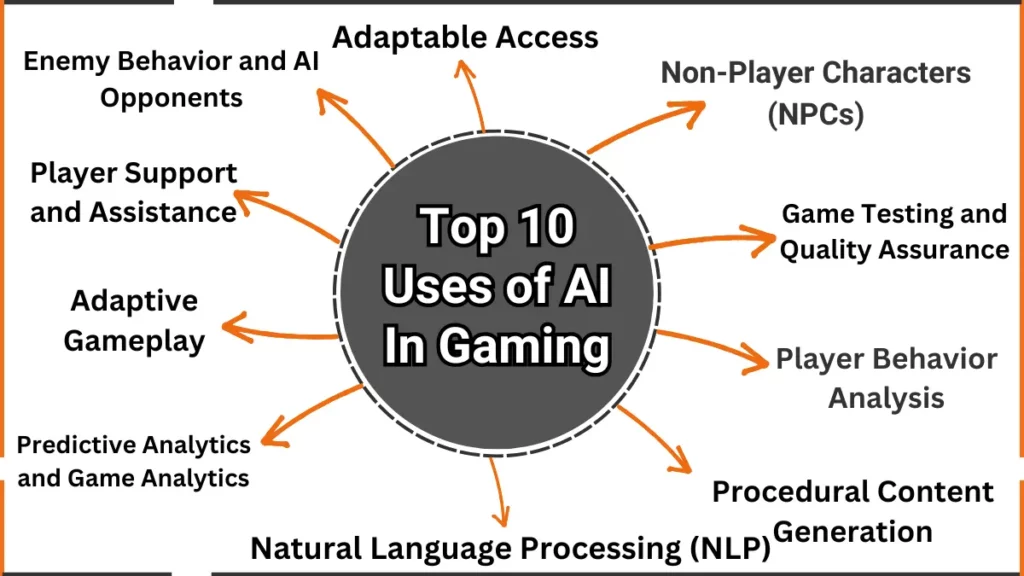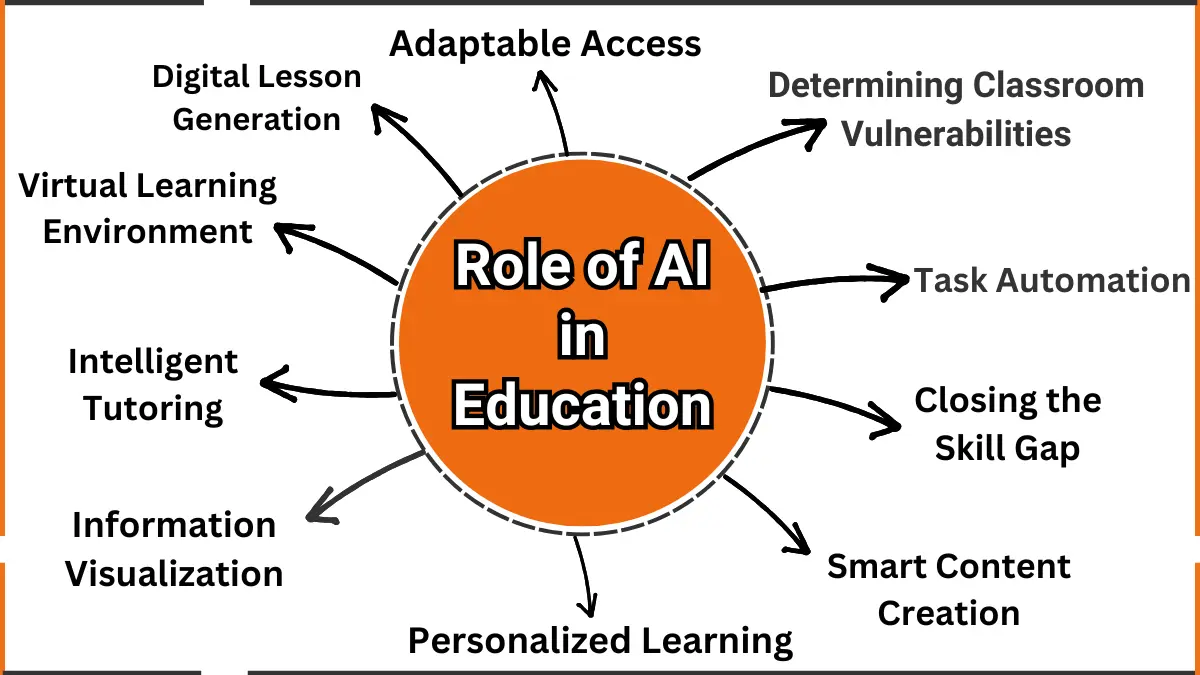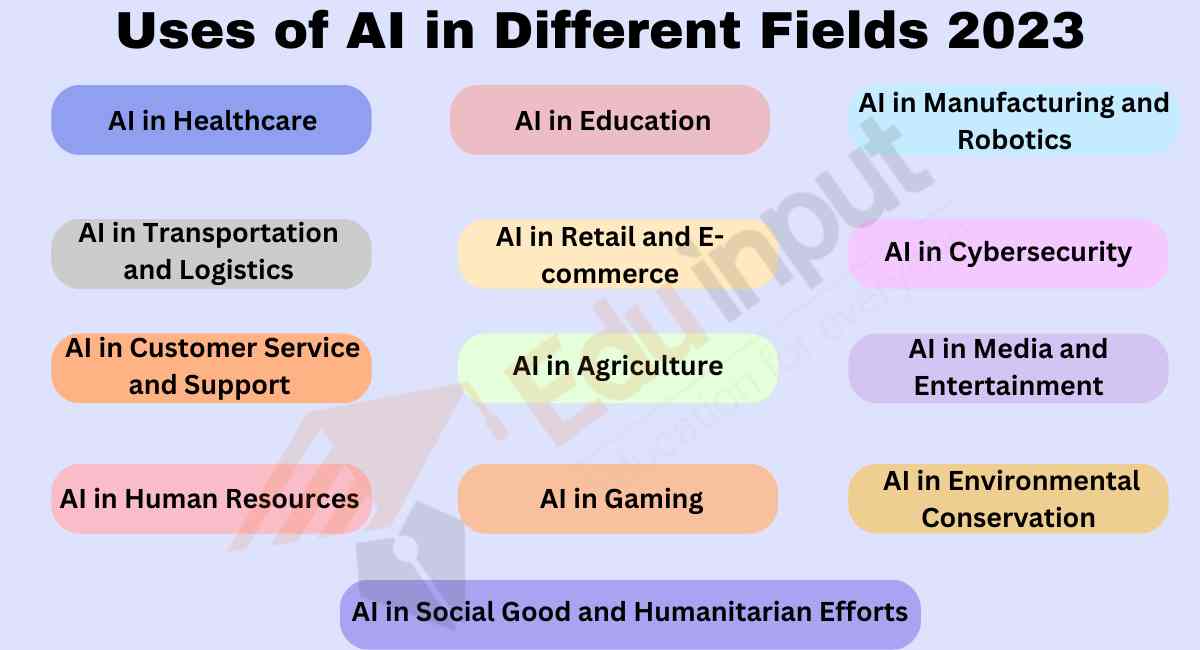Top 10 Uses of AI In Gaming
Artificial Intelligence (AI) plays a crucial role in the gaming industry. It is transforming the way games are designed, developed, and played. From realistic virtual worlds to intelligent non-player characters (NPCs) and adaptive gameplay, AI has revolutionized gaming experiences. AI is being used in different fields.
In this article, we will discuss AI’s uses in gaming and its significant impact on game design, player behaviour analysis, procedural content generation, and immersive experiences.

Uses of AI in Gaming
AI is playing an important role in the gaming industry:
1. Non-Player Characters (NPCs)
AI enables the creation of intelligent NPCs that exhibit lifelike behaviours and enhance the gaming experience. NPCs powered by AI algorithms can adapt to player actions, exhibit complex decision-making, and provide more realistic and challenging gameplay.
2. Player Behavior Analysis
AI algorithms analyze player behaviour data to gain insights into preferences, play styles, and skill levels. This information can be utilized to personalize gameplay experiences, offer tailored challenges, and provide individualized recommendations.
3. Procedural Content Generation
AI-driven procedural content generation techniques allow for creating vast and dynamic game worlds. AI algorithms can generate landscapes, environments, quests, and characters, providing unique and diverse gameplay experiences.
4. Adaptive Gameplay
AI algorithms dynamically adjust game difficulty and mechanics based on player performance. By monitoring player actions and skill levels in real-time, AI can provide appropriate challenges and adapt gameplay elements to ensure an engaging and balanced experience.
5. Natural Language Processing (NLP)
AI-powered NLP and voice recognition technologies enhance player interactions within games.
6. Voice Recognition
Players can engage in voice-controlled dialogue with NPCs, issue voice commands for gameplay actions, and experience more immersive and natural interactions within the game world.
7. Enemy Behavior and AI Opponents
AI algorithms govern the behaviour of enemies and AI-controlled opponents in games. These algorithms simulate intelligent decision-making, allowing enemies to exhibit strategies, adapt to changing circumstances, and provide challenging and realistic gameplay encounters.
8. Player Support and Assistance
AI-powered assistants, such as in-game chatbots or virtual guides, can provide players with real-time tips, hints, and support. These assistants offer guidance, answer questions, and assist players in overcoming challenges, enhancing the overall gaming experience.
9. Game Testing and Quality Assurance
AI algorithms automate game testing processes, allowing for quicker identification and resolution of bugs, glitches, and other issues. Machine learning models can learn from patterns in player behaviour and provide insights to improve game mechanics, performance, and user experience.
10. Predictive Analytics and Game Analytics
AI-powered predictive analytics analyze player data to predict player behaviour, preferences, and engagement patterns. This information helps game developers make informed decisions regarding game design, monetization strategies, and content updates.
FAQs
What is the role of AI in gaming?
AI in gaming creates intelligent characters, enhances gameplay, and provides a more engaging experience for players.
How does AI impact game development?
AI speeds up game development by generating realistic environments, testing game mechanics, and creating dynamic storylines.
What is the future of AI in gaming?
AI will create more immersive, adaptive, and realistic games, revolutionizing how players interact with virtual worlds.







Leave a Reply